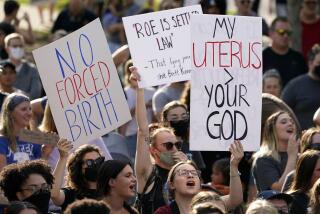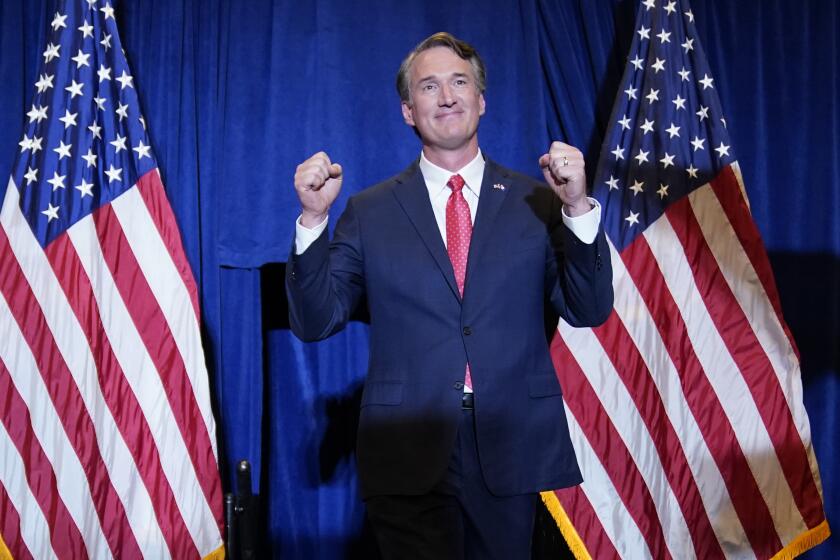Romney looks poised for Iowa victory, maybe even if he loses
Reporting from Des Moines — After a campaign effort that has defied convention and angered top Iowa Republicans, Mitt Romney is well-positioned to emerge as a big winner in Tuesday’s presidential caucuses.
The tightest GOP caucus contest in decades features Romney, Ron Paul and a fading Newt Gingrich in a virtual tie for the lead, making the final days of politicking unusually consequential. And another candidate, Rick Perry or Rick Santorum, could get hot at the end and knock one of the favorites out of the top three.
But it seems increasingly likely that Romney, condemned only last month by Iowa’s Republican governor for ignoring the state, has managed to finesse the tricky voter test that he failed four years ago. He ran second then to upstart Mike Huckabee, the former Arkansas governor and ex-evangelical minister, despite investing huge amounts of time and money.
Just before flying to Iowa on Tuesday for a four-day campaign swing, Romney said that expectations were “very different this time.” He then tried to lower them, noting that a couple of weeks ago he “was a distant third in Iowa, and you just don’t know what’s going to happen in this process.”
Gingrich, struggling to hold the lead he had gained in the polls, lashed out at his main rivals. In a CNN interview from his tour bus stop in Dubuque, he said he would not vote for Paul if he became the nominee, describing the Texas congressman’s views as “totally outside the mainstream of virtually every decent American.”
He ridiculed Paul for newsletters sent out under Paul’s name in the late 1980s and early 1990s that Gingrich said were “racist, anti-Semitic [and] called for the destruction of Israel.” Paul has disavowed the newsletters.
As for Romney, Gingrich said he should be “man enough to own” the anti-Gingrich ads run by a group of Romney’s “millionaire friends” for which the former Massachusetts governor raised money. The ads have run nonstop for weeks in Iowa.
Gingrich said that his campaign was “going to stay totally positive,” but added that caucusgoers had “a great opportunity” to “send a signal to the country that negative ads written by dishonest consultants on behalf of irresponsible candidates do not deserve getting votes.” Romney contends that he can’t tell the “super PAC” to stop the ads because federal law prohibits him from coordinating the group’s activities with his candidacy.
In a further sign of how different 2012 is turning out to be from 2008, another runner-up finish for Romney in Iowa would be interpreted as a victory this time — assuming that Paul wins. The libertarian lawmaker from Houston, whose fervent base of supporters continues to expand, is considered too extreme to have a realistic chance of becoming the nominee. But his emergence as the early GOP leader should he win in Iowa would severely complicate Perry’s or Gingrich’s ability to challenge the deep-pocketed Romney in upcoming primaries.
“There are two good scenarios for Romney in Iowa: Romney wins or Paul wins,” said Sara Taylor Fagen, a nonaligned Republican strategist.
With six candidates crisscrossing the state in a furious closing rush, and continued mild weather in the forecast, Iowa Republicans predict a heavier turnout than last time. That could favor Romney over Paul, who is thought to have the most dedicated supporters and therefore would be expected to benefit if turnout was low.
In 2008, Romney based his Iowa campaign on a 20-year-old plan developed for Bob Dole in 1988. This time, Romney, who says he is “driven by data,” has pioneered a new path. It relies heavily on technology and far less on in-person campaigning, which is inefficient and, in Romney’s case, exposes one of his greatest weaknesses: his difficulty connecting on a personal level with ordinary voters.
“We’ve run a much different campaign than we ran four years ago — obviously and not so obviously,” said David Kochel, a Des Moines direct-mail specialist who has worked for Romney since 2002 and is managing the 2012 statewide effort.
The most obvious difference: Romney has made himself scarce. Though he insisted from the start that he would compete in Iowa, his relatively infrequent visits — the latest is only his eighth — raised questions about how hard he would fight to win. Iowa’s GOP caucuses have been dominated by evangelical Christians, many of whom mistrust Romney’s Mormon faith and whether he is a true conservative. He skipped the August straw vote that he won in 2008, saving more than $1 million and avoiding a potential embarrassment if he failed to repeat.
By holding Iowa at arm’s length, the ex-governor managed to keep his options open and expectations in check. But he also provoked Gov. Terry Branstad, who grew increasingly fretful that his state’s status in the presidential game would suffer permanent harm if another GOP front-runner essentially skipped the caucuses, as John McCain did in 2008.
Iowans “don’t like being ignored,” the governor said last month, decrying what he called the Romney campaign’s “East Coast mentality.” The outburst hurt Romney among the party regulars he must attract if he is to win.
It was a rare Iowa slip-up for Romney strategists, who by the end of November had decided to step up their caucus effort. Operating on a sharply reduced budget with fewer hired workers (the fifth Iowa staffer was added only last month), Romney has leveraged his biggest asset in the state: the 30,000 Iowans who voted for him in 2008. According to internal campaign estimates, about 80% will be in his corner again Tuesday.
No other Republican began with a similar base of support (Paul, who got about 12,000 votes last time, is the only rival who ran in 2008). Working behind the scenes, Romney’s team in Boston used sophisticated micro-targeting to locate new supporters. His backers across the country pitched in to make phone calls, while paid phone banks, targeted mail, personalized email, text messaging and automated calls were also used to contact voters. Other campaigns have used many of the same techniques, but not on the same scale.
Romney and leading surrogates, such as New Jersey Gov. Chris Christie, participated in 15 telephone town-hall sessions with as many as 15,000 to 20,000 Iowa voters at a time. Voters were carefully selected to hear messages tailored to their concerns; multiple sessions were devoted to immigration, an issue on which Romney has staked out a position to the right of his leading opponents. At the end of the calls, voters were encouraged to push a button on their phone to sign up as precinct captains at one of the 1,774 sites where caucuses will take place on Jan. 3.
Romney is also benefiting from a split among evangelicals — who may divide their votes evenly enough to prevent either Perry, Santorum or Michele Bachmann from winning. Reflecting the continuing threat posed by Gingrich or a revitalized Perry, a new attack ad in Iowa, sponsored by a pro-Romney group, goes after both men.
Romney and the super PAC supporting him account for nearly $4 million of the record $10 million in ad spending on the GOP contest this month, according to a Des Moines Register tally. Perry and Paul are the only other candidates benefiting from significant ad buys in the state. The commercials, along with heavily watched TV debates that have nationalized the pre-primary campaign, appear to be driving voter attitudes to an unprecedented degree in Iowa.
If Romney is successful on caucus night, it will further the shift away from the state’s tradition of close-up campaigning by presidential candidates. But because his strategy is an outgrowth of an investment laid down in 2008, it’s unclear whether future candidates can follow his model. Already, though, Romney is using a similar plan to reach voters in other early states.
On Monday night, he conducted separate telephone town halls with thousands of voters in Iowa, South Carolina and Florida. Listeners in the Sunshine State were a targeted group: those who had already requested absentee ballots.
“It’s about contacting voters with a message that resonates,” said Rich Beeson, the campaign’s national political director. “It’s not like there’s going to be a different playbook as we move through the other states.”
Times staff writer Maeve Reston contributed to this report from New Hampshire.
More to Read
Get the L.A. Times Politics newsletter
Deeply reported insights into legislation, politics and policy from Sacramento, Washington and beyond. In your inbox three times per week.
You may occasionally receive promotional content from the Los Angeles Times.










